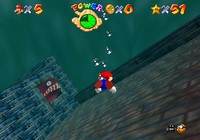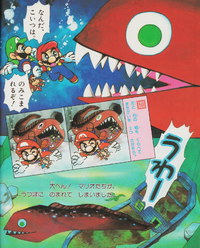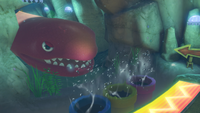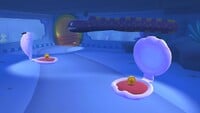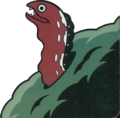Maw-Ray
- Not to be confused with Maw-Maw.
| Maw-Ray | |||
|---|---|---|---|
Artwork from Super Mario Odyssey | |||
| First appearance | Super Mario 64 (1996) | ||
| Latest appearance | The Super Mario Bros. Movie (2023) | ||
| |||
| |||
Maw-Rays, referred to as Unagi[1][2] prior to Super Mario Odyssey, are recurring eel enemies in the Super Mario franchise that debuted in Super Mario 64. They are enormous maroon-colored morays dappled with yellow spots, often depicted nesting in underwater cavities on the seafloor of an area. Maw-Rays typically lunge at player characters that approach their cavities with snapping jaws.
Maw-Rays are the first of several large cave-dwelling eel enemies in the Super Mario series that exhibit similar behavior, including Eely-Mouth, Gringills, and Spike Eels.
History[edit]
Super Mario series[edit]
Super Mario 64 / Super Mario 64 DS[edit]
One Unagi, also referred to as Unagi the eel[3] or simply as the Eel,[4] appears in Super Mario 64 and its Nintendo DS remake. In the Jolly Roger Bay mission, Plunder in the Sunken Ship, Mario can lure Unagi out of its sunken ship home by swimming near and provoking it to attack. The player must then swim a short distance away and then swim back to the ship. Unagi will have left the ship, allowing the player to enter it via the ship's window. Unagi is the focus of the next mission, "Can the Eel Come Out to Play?," where it now appears in a water cove. Unagi can be lured out in the same manner as before, and it now has a Power Star attached to its tail that can be obtained by touching it. However, if too much time passes, Unagi will return to the alcove and has to be lured out again. In later missions, Unagi circles where the sunken ship formerly was.
New Super Mario Bros.[edit]
Unagi and their big counterparts appear as underwater enemies in New Super Mario Bros. Unagi keep their Super Mario 64 DS design. They are encountered only in World 4-3 and World 8-3. Some Unagi swim around while others live in small underwater coves, attacking anything in its vicinity. Unagi can be defeated with a Mega Mushroom or a Super Star.
Super Mario Odyssey[edit]
In Super Mario Odyssey, Maw-Rays (referred to by this name for the first time) make an appearance as enemies, primarily in the Underwater Tunnel to the Lighthouse in the Seaside Kingdom. They are redesigned to have a more detailed appearance with realistic anatomy as well as menacing, glowing eyes. Similar to their appearance in New Super Mario Bros., they attack by lunging out of their nesting spots at a high speed before snapping their enormous jaws and receding, and can be positioned either horizontally or vertically. Before they emerge, a plume of sand can be seen coming from their caves. Entering these caves is impossible, as they appear to be blocked with sand. A few Maw-Rays also appear in one area of the Mushroom Kingdom; here, their caves are not seen, as they instead lunge upwards out of the clouds.
A Spike Eel appears in concept art for the Underwater Tunnel to the Lighthouse in the Seaside Kingdom in place of Maw-Rays, but they were eventually replaced by Maw-Rays.[5]
Mario no Bōken Land[edit]
The manga Mario no Bōken Land features adaptations of various games, one of them including Super Mario 64. The Super Mario 64 section of the book features Mario, Luigi and Donkey Kong traversing through several of the worlds in Super Mario 64; one of them, being an encounter with Unagi in Jolly Roger Bay. Unagi eats them, but Mario's sword allows them to escape.
Mario Golf[edit]
In Mario Golf, Unagi's name is sometimes on the score card.
Mario Party series[edit]
Maw-Rays appear only a few times in the Mario Party series. In Mario Party 3, a brown Unagi appears in the foreground of Deep Bloober Sea, attempting to take a bite from a pink Sushi's tail. A similar giant turquoise eel also appears nearby. In the minigame Manta Rings from Mario Party 4, a reddish-brown eel resembling an Unagi darts in front of the characters with a high-pitched noise as they pass a sunken ship. If bumped into, three points are deducted.
Mario Kart series[edit]
Mario Kart Wii[edit]
Several Unagi in Mario Kart Wii appear in the background of the underwater tunnel segment Koopa Cape, poking their heads out of various Pipes, and a closer Unagi can be seen swimming outside of Chain Chomp Wheel.
Mario Kart 7[edit]
Unagi in Mario Kart 7 similarly appear in the underwater sections of GCN Daisy Cruiser and Wii Koopa Cape.
Mario Kart Arcade GP DX[edit]
In Mario Kart Arcade GP DX, Unagi make a small appearance in the underwater parts of the race track Tropical Coast.
Mario Kart 8 / Mario Kart 8 Deluxe[edit]
A single Maw-Ray (referred to by its original name Unagi in the Wii U version's Prima guide)[6] appears in an underwater section of the Mario Kart 8 and Mario Kart 8 Deluxe course Dolphin Shoals, where players race along its body for a short section and can perform Jump Boosts from its undulating body. They also make a return in the booster courses GCN Daisy Cruiser, Wii Koopa Cape, and Piranha Plant Cove, once again making cameos in the underwater sections of each course and retaining their design and model from Mario Kart Tour.
Mario Kart Tour[edit]
In Mario Kart Tour, Maw-Rays appear in the underwater sections of several courses. They utilize their design from Super Mario 64 DS in this appearance, which was also used in previous Mario Kart games. Unlike other sentient obstacles in the game, they are not affected by items whatsoever. They are found in the following courses:
- Piranha Plant Cove
- Piranha Plant Cove R
- Piranha Plant Cove R/T
- Piranha Plant Cove 2
- Piranha Plant Cove 2R
- Piranha Plant Cove 3
- Piranha Plant Cove 3R
- GCN Daisy Cruiser
- GCN Daisy Cruiser T
Most Maw-Rays simply roam around an area above the track, usually after emerging from a pipe in a wall. In Piranha Plant Cove 2, Piranha Plant Cove 2R, and GCN Daisy Cruiser T, Maw-Rays can be interacted with, as there are currents that can send drivers high enough to reach them; they act as minor, wall-like obstacles that simply cause drivers to lose some speed when run into. The Maw-Ray in Piranha Plant Cove 2 can be bounced off of for Jump Boosts.
In Piranha Plant Cove 3 and its T variant, one Maw-Ray lurks inside a hole, lunging at drivers to bite them. Drivers who run into this Maw-Ray spin out.
The Super Mario Bros. Movie[edit]
- “So this is the end: being slowly digested by an eel next to an... idiot in overalls.”
- —Donkey Kong
A large Maw-Ray appears in The Super Mario Bros. Movie, where it consumes Mario and Donkey Kong after they plummet from Rainbow Road. Soon after, the two are able to escape the Maw-Ray by using a Rocket Barrel from the remains of DK's kart. The Maw-Ray's design is based off the enemy's appearance in Super Mario Odyssey.
Gallery[edit]
- For this subject's image gallery, see Gallery:Maw-Ray.
Naming[edit]
Etymology[edit]
The English name "Unagi" is shared with a Japanese dish traditionally made out of the freshwater eel Anguilla japonica, similar to the shark enemy Sushi that also debuted in Super Mario 64. The name "Maw-Ray," introduced with its more realistic eel design in Super Mario Odyssey, is a play on "maw" and "moray." This name is more comparable in origin to its Japanese name「ウツボ」(Utsubo), the common name for real moray eels.
Internal names[edit]
| Game | File | Name | Meaning
|
|---|---|---|---|
| Super Mario 64 DS | data/enemy/moray | moray | English translation of the Japanese name |
| New Super Mario Bros. | data/enemy/moray.nsbmd | ||
| Mario Kart Arcade GP DX | Data/Model/Object/moray | ||
| Mario Kart Tour | assets/main/content/mapobj/moray/moray_prm.asset |
Names in other languages[edit]
The contemporaneous name for each language is listed first. Subsequent names are listed in chronological order for each language, from oldest to newest, and have the media they are associated with in the "notes" column.
| Language | Name | Meaning | Notes |
|---|---|---|---|
| Japanese | ウツボ[7][8][9][10][11] Utsubo |
Moray | |
Ō Utsubo |
Big Moray | Super Mario (Kodansha manga) | |
| ウツボ( Utsubo (Shō) |
Moray (Small); named in relation to Mega Maw-Ray | New Super Mario Bros. | |
| Chinese (Simplified) | 海鳗[14][15] Hǎimán (Mandarin) Hóimàahn (Cantonese) |
Moray | |
| Chinese (Traditional) | 海鰻[15] Hǎimán (Mandarin) Hóimàahn (Cantonese) |
Moray | |
| 鱔怪[16] Shànguài (Mandarin) Síhn'gwaai (Cantonese) |
Eel Monster | ||
| Dutch | Maw-Ray[15] | - | |
| French (Canadian) | Mordrène[15] | Portmanteau of mordre ("to bite") and murène ("moray") | |
| French (European) | Mordrène[15] | Portmanteau of mordre ("to bite") and murène ("moray") | |
| Anguille[14][17] | Eel | Super Mario 64 | |
| Murène[18] | Moray | ||
| Unagi[19] | - | New Super Mario Bros. | |
| German | Murani[15] | From Muränen ("moray") | |
| Kano[14][20] | Romanization of the Japanese surname「狩野」(Kano) | Super Mario 64 | |
| Italian | Mordorena[15][21][22] | Portmanteau of mordere ("bite") and murena ("moray") | |
| Anguilla gigante[23] | Giant eel | Super Mario 64 | |
| Anguilla[17] | Eel | Super Mario 64 DS | |
| Murena[24] | Moray | New Super Mario Bros. | |
| Korean | 곰치[25][15] Gomchi |
Moray | |
| Portuguese | Mordeia[26] | From morder ("to bite") and moreia ("moray") | |
| Russian | Мурена[15] Murena |
Moray | |
| Spanish (Latin American) | Mordimore[15] | From morder ("to bite") and morena ("moray") | |
| Spanish (European) | Mordimore[15] | From morder ("to bite") and morena ("moray") | |
| Morena[17][27] | Moray | Super Mario 64 | |
| Unagi la anguila[28]:85 | Unagi the eel | Super Mario Bros. Encyclopedia | |
| Angulo[28]:114 | Masculinized form of anguila ("eel") |
References[edit]
- ^ Pelland, Scott and Dan Owsen (1996). The Super Mario 64 Player's Guide. Redmond: Nintendo of America. Page 12.
- ^ Loe, Casey (2006). New Super Mario Bros. Official Player's Guide. Redmond: Nintendo of America. ISBN 1-59812-009-3. Page 12.
- ^ Pelland, Scott, and Dan Owsen (1996). Super Mario 64 Player's Guide. Nintendo of America (American English). Page 33.
- ^ Eel - (Course 3). Nintendo: Super Mario 64 Strategy. Retrieved 22 May 2024. (Archived February 24, 1998, 21:17:09 UTC via Wayback Machine.)
- ^ Sakai, Kazuya, kikai, Rachel Roberts, and Jenny Blenk, editors (2019). The Art of Super Mario Odyssey (First English Edition). Dark Horse Books. ISBN 978-1-50671-375-5. Page 228.
- ^ Musa, Alexander (May 30, 2014). Mario Kart 8 PRIMA Official Game Guide. Prima Games (American English). ISBN 978-0-804-16328-6. Page 100.
- ^ Takashi, Watanabe, Noriko Oketani, Yugo Nagasawa, and Junichiro Okubo, editors (1996). 『任天堂公式ガイドブック スーパーマリオ64』(Nintendo Kōshiki Guidebook – Super Mario 64). Tokyo: Shogakukan (Japanese). ISBN 4-09-102554-4. Page 4.
- ^ Noriaki, Kamiguchi, Kaisa Hitoshi, Teshiromori Nobuhito, Nagashima Kazutaka, Somoto Shitsuya, and Matsumoto Royo (2005). 『「スーパーマリオ64DS」タッチ!&ゲット!パワースター
攻略 ブック』. Tokyo: Kadokawa (Japanese). ISBN 4-8402-2960-0. Page 65. - ^ Shogakukan editors (2006). 「敵キャラクターリスト」in『ニュー・スーパーマリオブラザーズ: 任天堂公式ガイドブック』. Tokyo: Shogakukan (Japanese). ISBN 4-091063-07-1. Page 17. Retrieved from Imgur.
- ^ Sakai, Kazuya (ambit), kikai, Akinori Sao, Junko Fukuda, Kunio Takayama, and Ko Nakahara (Shogakukan), editors (2015). 『スーパーマリオブラザーズ百科: 任天堂公式ガイドブック』. Tokyo: Shogakukan (Japanese). ISBN 978-4-09-106569-8. Page 85, 114.
- ^ Sakai, Kazuya, and kikai, editors (2018). 『スーバーマリオ オデッセイ 公式設定資料集』. Tokyo: ambit (Japanese). ISBN 978-4-19-864696-7. Page 235.
- ^ Motoyama, Kazuki (6 Nov. 1996). Super Mario 64 1, Super Mario, vol. 36. Kodansha (Japanese). Page 6.
- ^ Kashima, Aya, Daisuke Kitayama, Itaru Nakatani, Seishiro Fuwa, Isamu Horie, and Yoji Watanabe (2006). 『ニュー・スーパーマリオブラザーズ』. Tokyo: ambit (Japanese). ISBN 4-8399-2000-1. Page 14.
- ^ a b c In-game name for "Can the Eel Come Out to Play?" from Super Mario 64.
- ^ a b c d e f g h i j k Seaside Kingdom brochure (2017). Super Mario Odyssey by Nintendo EPD Tokyo (Ver. 1.3.0). Nintendo.
- ^ The Official Mario 64 Chinese Strategy Guide
- ^ a b c In-game name for "Can the Eel Come Out to Play?" from Super Mario 64 DS.
- ^ Huyghues-Lacour, Alain, and Jean-Pierre Labro, editors (1997). "Super Mario 64" in le Nintendo Magazine officiel, no. 1. Emap-Alpha (French). Page 86.
- ^ Loe, Casey (2006). New Super Mario Bros., le guide de stratégie officiel. Hamburg: Future Press (French). ISBN 3-937336-61-3. Page 12.
- ^ Kraft, John D., Thomas Görg, and Marko Hein, editors (1997). Der offizielle Nintendo 64 Spieleberater "Super Mario 64". Großostheim: Nintendo of Europe GmbH (German). Page 7.
- ^ Sakai, Kazuya (ambit), kikai, Akinori Sao, Junko Fukuda, Kunio Takayama, Ko Nakahara (Shogakukan), and Marco Figini, editors (2018). "Super Mario 64" in Super Mario Bros. Enciclopedia. Translated by Marco Amerighi. Milan: Magazzini Salani (Italian). ISBN 889367436X. Page 85.
- ^ Sakai, Kazuya (ambit), kikai, Akinori Sao, Junko Fukuda, Kunio Takayama, Ko Nakahara (Shogakukan), and Marco Figini, editors (2025). "Super Mario 64" in Super Mario Bros. Enciclopedia (2nd ed.). Translated by Alessandro Apreda. Milan: Magazzini Salani (Italian). ISBN 979-1259575760. Page 85.
- ^ Roberto Ferri (April 1999). Official Nintendo Magazine issue 6. Milan: Xenia Edizione S. r. L. (Italian). Page 71.
- ^ Andrea Minini Saldini (July 2006). Nintendo La Rivista Ufficiale Numero 54. Milan: Future Media Italy SpA (Italian). Page 53.
- ^ 2007. 기본코스 3 : 해적들이 있었던 바닷가. 슈퍼 마리오 64 DS (Korean). Tab 1, 2. Archived September 15, 2008, 02:55:44 UTC from the original via Wayback Machine.
- ^ "DICA: Mordeias, que habitam buracos e embarcações naufragadas, tentarão dificultar sua exploração" – Nintendo Today! Guide to the world of Super Mario (Jolly Roger Bay).
- ^ Guías Nintendo (2007). Plunder in the sunken ship (El botín del barco hundido). Guía Super Mario 64 (European Spanish). (Archived April 18, 2024, 12:37:59 UTC via Wayback Machine.)
- ^ a b Sakai, Kazuya (ambit), kikai, Akinori Sao, Junko Fukuda, Kunio Takayama, and Ko Nakahara (Shogakukan), editors (2017). Enciclopedia Super Mario Bros. 30ª Aniversario. Translated by Gemma Tarrés. Barcelona: Editorial Planeta, S.A. (European Spanish). ISBN 978-84-9146-223-1.
